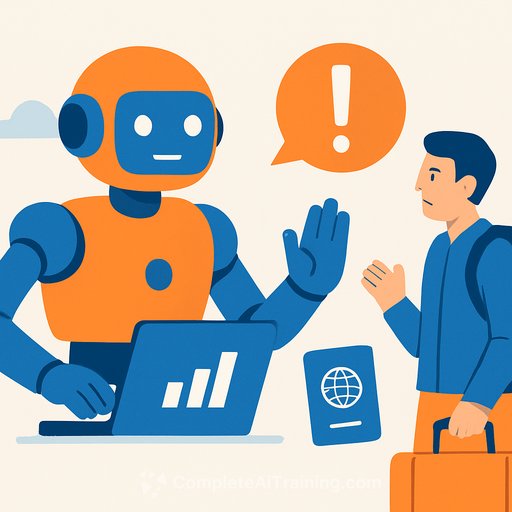AI breaks into travel, but trust still decides the booking
AI now touches every part of travel: planning, pricing, rebooking, support. Usage of generative tools jumped 64% in the past year, and 64% of travelers say they have tried AI to plan trips. Yet many people still line up to talk to a human when plans fall apart.
Data points tell the story. A quarter of travelers like digital self-service, but 29% say that during disruptions, speaking with a person is most reassuring. One in four users found AI outputs outdated or inaccurate. Speed helps, but trust closes the loop.
AI amplifies people, it doesn't replace them
Amadeus powers core systems for airlines, OTAs, hotels, and airports. The goal, as described by Jonathan Tong, Senior Vice President, Airlines, Southeast Asia, China & India at Amadeus, is simple: faster systems are table stakes; calmer travelers are the outcome.
AI should help at critical moments-ID checks, security, flight changes-by surfacing the right options instantly and making next steps clear. The real shift is handing decision-making back to the traveler so they feel in control, not in the dark.
Speed is baseline. Trust is the differentiator.
In markets like China, travelers and OTAs move at millisecond speed. If results lag, people switch platforms. That's why Amadeus synchronizes data, pricing, and inventory across partners in real time and continuously learns which options are most likely to be chosen.
But automation without empathy stalls adoption. Providers must calibrate how much autonomy users want, when to offer a human, and how to show their work. Efficiency gets you considered; trust gets you booked.
The boundary of trust: know more, overreach less
To be helpful, AI needs context. To keep trust, it needs limits. Amadeus focuses on connecting partner data to improve services while avoiding unnecessary exposure of personal identities.
Group-level signals and choice patterns can refine products without touching private data. This "understanding at a distance" keeps systems smart and boundaries clear.
For IT and development teams: what to build next
- Freshness over flash: Prioritize live data over static prompts. Wire real-time feeds for schedules, fares, inventory, disruptions, and policies. Cache smartly, not blindly.
- Transparent reasoning: Show why an option is recommended (price history, reliability, rebooking flexibility). Let users tweak constraints and see outcomes update.
- Human-in-the-loop by default: One-tap handoff to agents during irregular ops. Preserve context so travelers never repeat themselves.
- Trust metrics, not vanity metrics: Track output accuracy, data freshness, time-to-resolution, rebooking success rate, human escalation rate, and post-issue satisfaction.
- Guardrails that matter: Policy-aware agents that refuse to guess. Prefer "I don't know" with a safe next step over confident nonsense.
- Privacy by design: Aggregate learning on behavior without storing unnecessary PII. Short retention windows. Clear opt-ins. Easy revocation.
- Resilience at scale: Event-driven architecture, backpressure, and graceful degradation during spikes. Offline queues for updates and refunds.
- Evaluation in production: Continuous eval sets for hallucinations, outdated content, policy violations, and bias. Shadow deploy before turning knobs.
The A2A era: agent-to-agent conversations
Every traveler may soon have an AI assistant. Every provider will have one too. These agents will negotiate seats, handle disruptions, and complete bookings on your behalf.
- Standards and schema: Define a stable contract for offers, ancillaries, fees, and exceptions. Version everything.
- Identity and consent: Strong auth, scoped permissions, explicit delegation, and revocation. Log every decision.
- Policy engines: Fare rules, loyalty, vouchers, and irregular ops encoded as executable policies, not tribal knowledge.
- Service quality: SLOs for response time, accuracy, and recovery. Rate limits and circuit breakers to keep the dance smooth.
This shift moves from human-to-system clicks to system-to-system dialogue. Brands must learn to serve the traveler and the traveler's agent equally well.
What travelers actually feel
Trips get faster when systems talk. Trips feel safer when people feel heard. AI can predict delays and present options, but reassurance still comes from clarity, agency, and a quick path to a human.
That's the bar. Deliver it, and trust compounds.
A practical stack for travel AI
- Real-time core: Streaming schedules, fare/rule engines, disruption feeds, inventory, loyalty, and policy layers.
- Intelligence: Retrieval-augmented LLM with structured tool use; ranking models trained on clicks and conversions; counterfactual tests.
- Experience: Conversational UI with inline evidence, editable constraints, and instant reprice/rebook flows.
- Oversight: Observability for prompts, tools, outputs, user impact; red-team pipelines; human review loops on sensitive actions.
Further reading and tooling
Amadeus' perspective on connected travel and digital self-service is public and worth a look. See their report for broader industry signals: Connected Travel research.
If you're upskilling teams building agents, retrieval, and evaluation, explore practical courses here: AI courses by job.
The end of technology is understanding
Smart systems shorten the path from problem to solution. They can optimize a process, but meaning still comes from how people feel during the process.
As one industry leader put it, the point isn't replacement-it's to make each trip smoother and more human. Ship speed. Earn trust. Build both, and the booking follows.
Your membership also unlocks:





